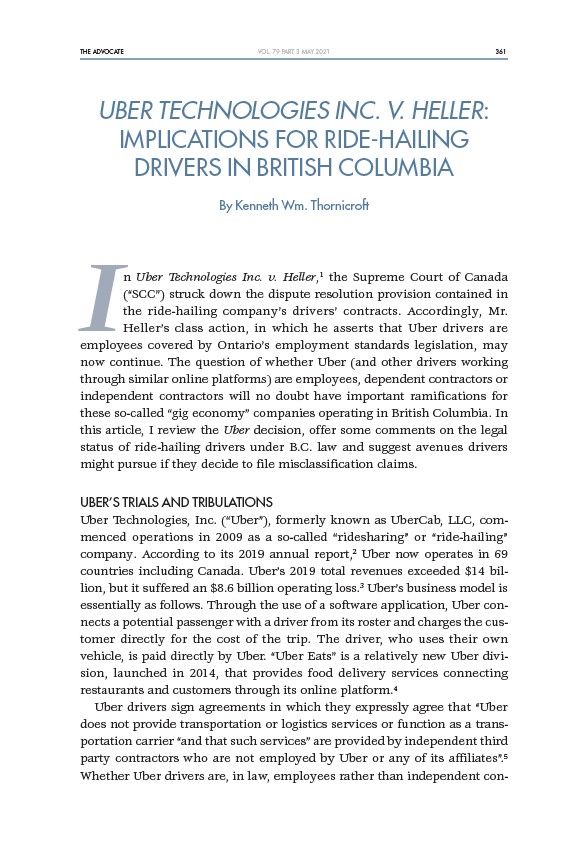
THE ADVOCATE 361
VOL. 79 PART 3 MAY 2021
UBER TECHNOLOGIES INC. V. HELLER:
IMPLICATIONS FOR RIDE-HAILING
DRIVERS IN BRITISH COLUMBIA
By Kenneth Wm. Thornicroft
In Uber Technologies Inc. v. Heller,1 the Supreme Court of Canada
(“SCC”) struck down the dispute resolution provision contained in
the ride-hailing company’s drivers’ contracts. Accordingly, Mr.
Heller’s class action, in which he asserts that Uber drivers are
employees covered by Ontario’s employment standards legislation, may
now continue. The question of whether Uber (and other drivers working
through similar online platforms) are employees, dependent contractors or
independent contractors will no doubt have important ramifications for
these so-called “gig economy” companies operating in British Columbia. In
this article, I review the Uber decision, offer some comments on the legal
status of ride-hailing drivers under B.C. law and suggest avenues drivers
might pursue if they decide to file misclassification claims.
UBER’S TRIALS AND TRIBULATIONS
Uber Technologies, Inc. (“Uber”), formerly known as UberCab, LLC, commenced
operations in 2009 as a so-called “ridesharing” or “ride-hailing”
company. According to its 2019 annual report,2 Uber now operates in 69
countries including Canada. Uber’s 2019 total revenues exceeded $14 billion,
but it suffered an $8.6 billion operating loss.3 Uber’s business model is
essentially as follows. Through the use of a software application, Uber connects
a potential passenger with a driver from its roster and charges the customer
directly for the cost of the trip. The driver, who uses their own
vehicle, is paid directly by Uber. “Uber Eats” is a relatively new Uber division,
launched in 2014, that provides food delivery services connecting
restaurants and customers through its online platform.4
Uber drivers sign agreements in which they expressly agree that “Uber
does not provide transportation or logistics services or function as a transportation
carrier “and that such services” are provided by independent third
party contractors who are not employed by Uber or any of its affiliates”.5
Whether Uber drivers are, in law, employees rather than independent con-